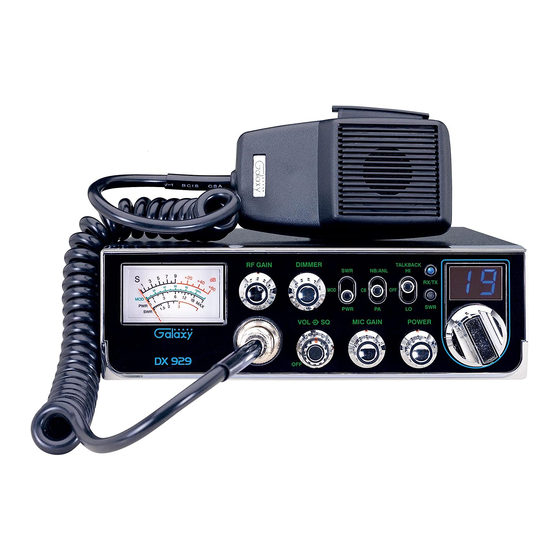Galaxy DX 929 Panduan Pemilik - Halaman 3
Jelajahi secara online atau unduh pdf Panduan Pemilik untuk Radio Galaxy DX 929. Galaxy DX 929 11 halaman. Two way citizens band mobile transceiver with starlite face plate

IGNITION NOISE INTERFERENCE
With weak signals, you may experience interference of the signal by background
noise. This radio has NB and ANL circuits which will help reduce background noise
from sources such as your ignition system. However, background electrical noise may
come from several sources and all noise may not be eliminated. With extremely weak
signals, you can operate this radio with the engine turned off, which should improve
reception. If the ignition noise level is too high to allow proper operation under most
conditions, you should have your installation of the radio checked by a qualified
technician.
ANTENNA
This radio has a jack in the rear for a standard PL-259 antenna plug. If you are
looking for the most range for your transmission, use a vertically polarized, quarter-
wave length antenna. If antenna height is a problem, you may use a shorter, loaded-
type whip antenna although you can expect some loss of transmission range.
To improve performance, your antenna should be matched to your radio. Your
antenna can be adjusted so that it matches your radio.
EXTERNAL SPEAKER
The external speaker jack (EXT SP.) on the rear panel is used for remote receiver
monitoring. The external speaker should have 8 ohms impedance and be able to
handle at least 4 watts. When the external speaker is plugged in, the internal speaker is
disconnected.
PUBLIC ADDRESS
To use the Public Address (PA) function, first connect an external speaker to the PA.
SP. Jack on the rear of the radio. See the above specifications for a proper external
speaker. Keep the speaker away from the microphone to avoid acoustic feedback.
- 4 -
CHAPTER 3 OPERATION
CONTROL FUNCTIONS
FRONT PANEL
8
9
10
RF GAIN
S
dB
60
MOD
PWR
SWR
DX 929
1
1. MICROPHONE JACK: Used to connect microphone for voice source.
2. SQUELCH CONTROL: This knob is used to eliminate background noise being
heard through the receiver, which can be disturbing when no transmissions are
being heard through the receiver. To use this feature, turn the knob fully
counterclockwise and then turn clockwise slowly until the background noise is
just eliminated. Further clockwise rotation will increase the threshold level which
a signal must overcome in order to be heard. Only strong signals will be heard at a
maximum clockwise setting.
3. ON/OFF VOLUME CONTROL: This knob controls the volume and power to
the radio. To turn radio on, rotate the knob clockwise. Turning the knob further
will increase the volume of the receiver.
4. MIC GAIN CONTROL: Adjusts the microphone gain in the transmit and PA
modes. This controls the gain to the extent that full talk power is available several
inches away from the microphone. In the Public Address (PA) mode, the control
functions as the volume control.
5.
POWER CONTROL: This control allows the user to adjust RF power output.
11
12
13
14
15
16
DIMMER
TALKBACK
SWR
NB/ANL
HI
RX/TX
CB
OFF
SWR
PWR
PA
LO
VOL
SQ
MIC GAIN
POWER
OFF
2
3
4
5
6
7
- 5 -
